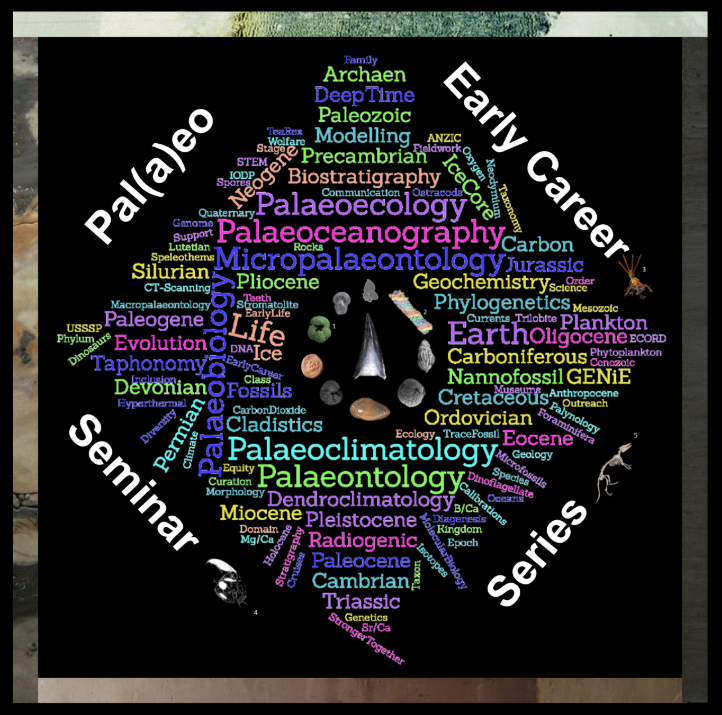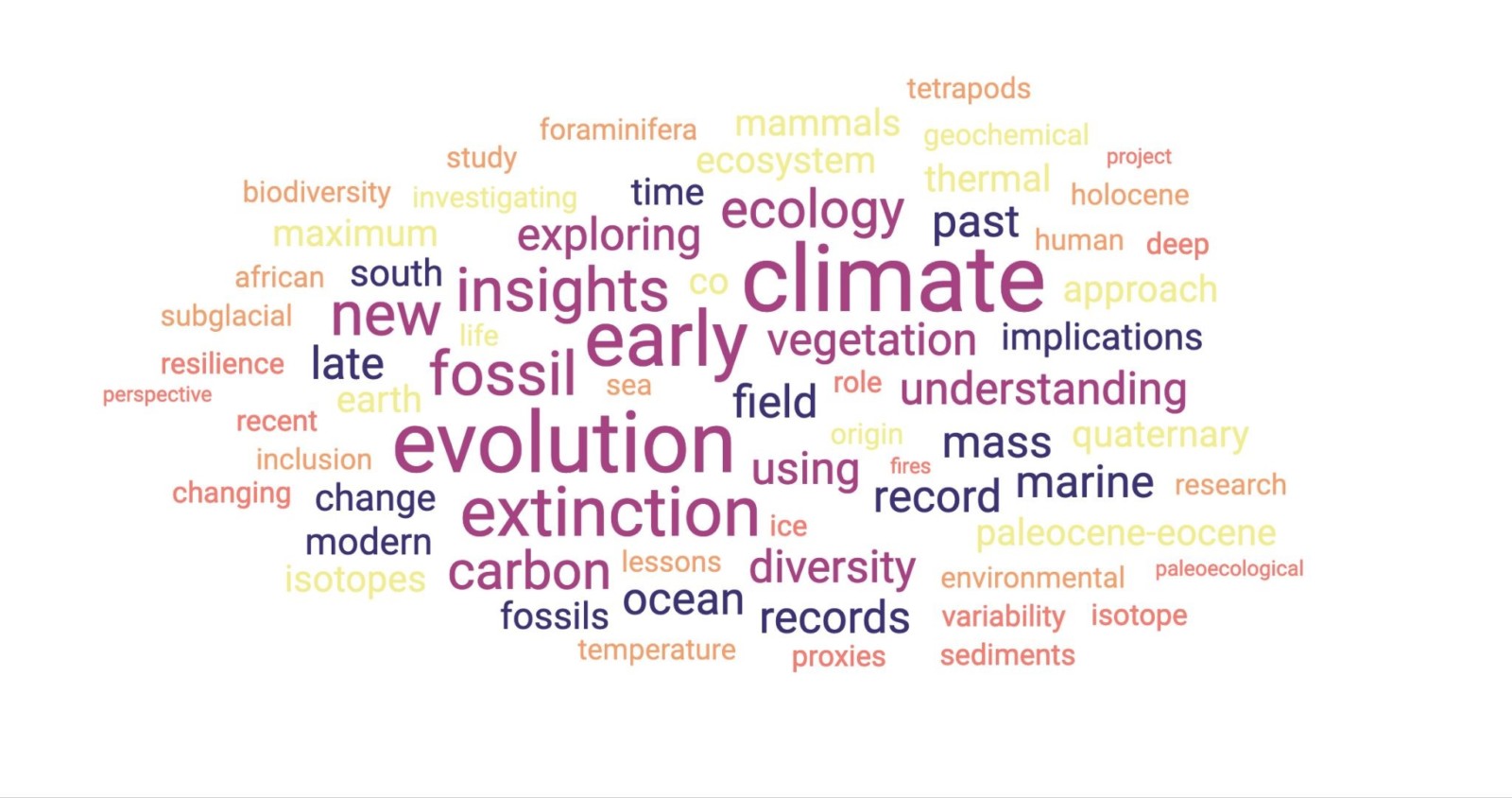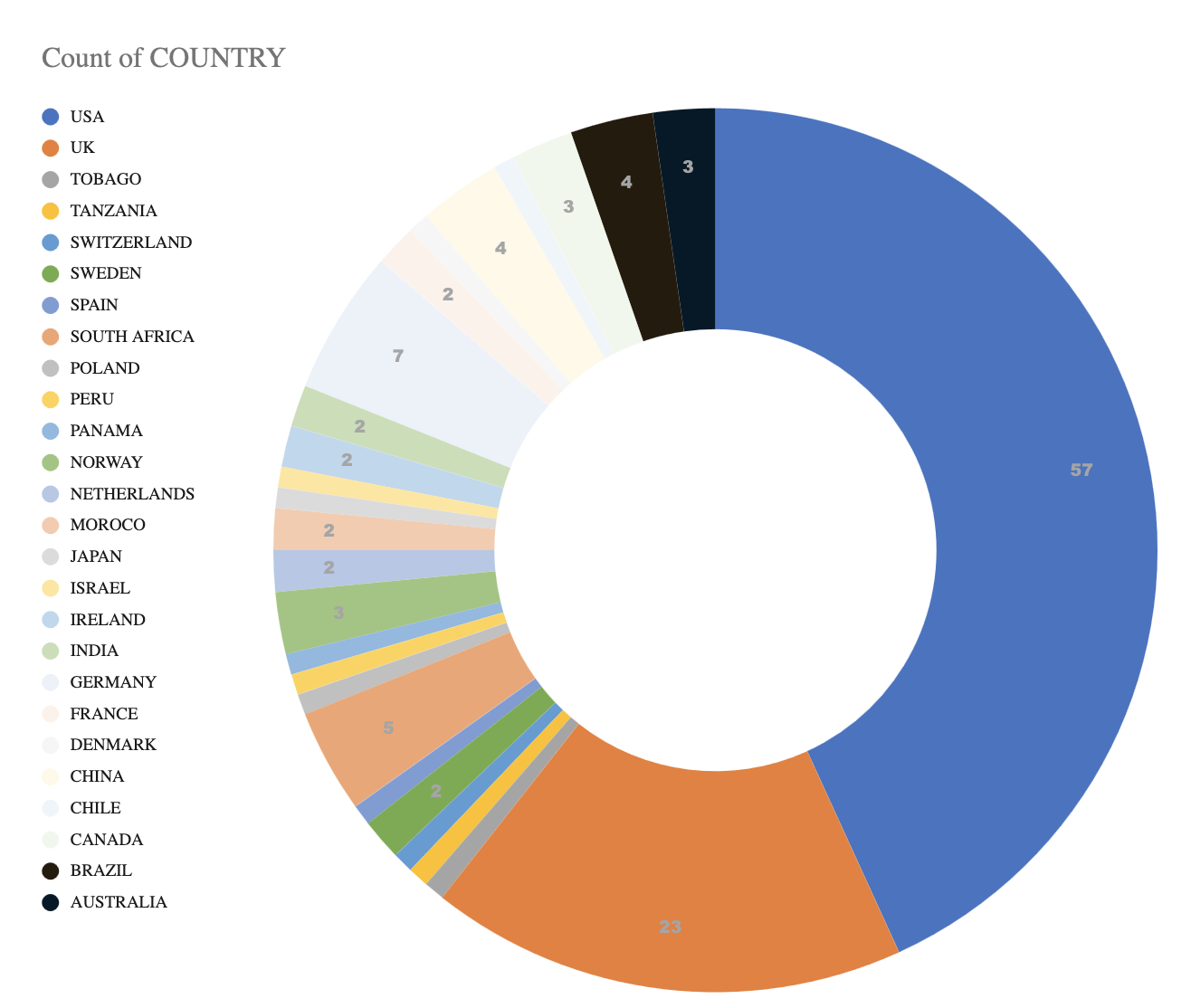
June 2020, amidst a global COVID-19 pandemic where social distancing and isolation brought the world to a standstill, a grassroots seminar series (Pal(a)eoPERCS) was started with the aim to bolster scholarly engagement and create a convivial space through weekly virtual seminars for Early Career Researchers and Professionals (ECRs).
Three years later, with June 2023 quickly approaching, Pal(a)eoPERCS will be entering its fourth year where we continue to support ECRs in Pal(a)eo sciences through weekly seminars. Whilst PERCS (Pal(a)eo EaRly Career Seminar) was initially created to fill a vacancy, we are excited to state that, we have had over 120 talks covering subjects related to all things Pal(a)eo -climatology, -biology, -chemistry, -oceanography, -anthropology (Figure 1). In the summer of 2022, we had a special speaker series themed around fieldwork, covering topics of accessibility, diversity, accommodation and inclusion in the field, and inclusion and accessibility for at-sea research and education. Further, in May 2022, three ECRs sailing as shipboard scientists on board the JOIDES Resolution broadcast live from International Ocean Discovery Program Expedition 390 (South Atlantic Transect I) and gave the PERCS community a behind the scenes view of ‘a life in the day of’ sailing on a research vessel. Asynchronous viewing of seminar talks through our YouTube channel further increases accessibility across communities, flexibility around schedules, reach to a global audience, and career stages. Since August 2021 we have also been working to secure financial support for the series, and are very thankful to be supported by seven learned societies and groups: The Royal Society of Chemistry, The Geochemistry Group, The Geological Society of London, The Cushman Foundation for Foraminiferal Research, The Paleontological Society, The Quaternary Research Association and The Linnean Society of London. We were also given an exciting opportunity to interview with Communications Biology in September 2022 – you can check our article here: https://www.nature.com/articles/s42003-022-03936-2. Roy Plotnick (Professor Emeritus at University of Illinois Chicago, USA) also highlighted the series in a book he published in 2022 entitled “Explorers of Deep Time: Paleontologists and the History of Life”. Most recently, we also collaborated with super talented scientific illustrator Miranta Kouvari. Miranta produced some amazing artwork for some of our early 2023 talks – you can see these on our Twitter feed! We are really appreciative of the support and positivity the community has extended to us in so many ways.

Figure 1: A word cloud created with over 100 Pal(a)eoPERCS Talk Titles. The size of each word indicates its frequency of use in Talk Title. In the figure, CO refers to CO2. The word cloud highlights the sub-disciplines within the pal(a)eosciences and raises further need of cross sub-discipline engagement. We used the Free Word Cloud Generator online website.
The choice to focus on diverse Early Career Researchers is entirely deliberate: researchers in the early stages of building their career and networks were some of the hardest hit by COVID-19, and ECRs were in some of the most precarious positions even prior to the pandemic. Even though the world has slowly been transitioning back to a pre-pandemic lifestyle with higher education institutions, (scientific) institutes, and organizations in many sectors prioritizing in-person (departmental) seminars, PERCS continues to provide a platform to bring together ECRs from all over the world. It is by uplifting ECRs from diverse backgrounds and perspectives that we will build a more supportive, equitable, and diverse scientific community for the future. We have had speakers from all geographic continents except Antarctica (Figure 2)! We continue to solicit community nominations and self-nominations, to further diversify the speaker pool and create future sustainability. If you are working at the McMurdo Antarctica Station or Halley Research Station, especially reach out – we would love to hear from you!
All Pal(a)eoPERCS organizers are committed to equity, diversity, inclusion, and accessibility (EDIA) within their own respective scientific sub-disciplines and workplaces, and we extend this commitment to Pal(a)eoPERCS. We value the presentations and attendance of diverse scientists from a range of backgrounds and experiences, and centre EDIA in our speaker scheduling and seminar organization. We started the series with a Code of Conduct that all participants and speakers must abide by during the seminar. Our accessibility efforts include live-captioning of talks using auto-captions, after-the-fact edited transcriptions, making seminar recordings available to attendees with conflicting schedules for later viewing, and encouraging our speakers to use colorblind-friendly graphics. This is not exhaustive however, and if anyone requests any further accessibility requirements, we try our hardest to implement them and work with those who contact us to best facilitate their participation.
PERCS aims to continue to provide a forum for fostering interdisciplinary collaboration within the different “flavours” of the pal(a)eo-sciences. The scholarly engagement across pal(a)eo themes creates an avenue for interdisciplinary connections, for example, ECRS from pal(a)eo-climate are able to engage with ECRS from pal(a)eo-biology. Each PERCS session is around 60-90 minutes: a 30-40 minute seminar, 10-20 minutes Q&A moderated by a PERCS committee member, followed by a 15-30 minute “tea-time”. The virtual tea-time is an informal setting with the speaker which encourages networking and fun scientific discussions and interactions. Graduate students and postdoctoral researchers are especially encouraged to stick around for “tea-time”, and the post-seminar discussion gives an opportunity for the speaker to interact more informally with the community as well.

Figure 2: Donut-hole representing speakers by country of research affiliation. The chart includes 133 talks scheduled till April 25, 2023. Pal(a)eoPERCS has had speakers from all geographic continents except Antarctica. The numbers within the slices indicate the frequency of speakers from a specific country. Slices without numericals are 1.
Whilst Pal(a)eoPERCS is created by a group of ECRs and will focus on featuring ECR speakers, we encourage folks at all career stages and spheres, from undergraduate to emeritus, industry to policy and the general public, to attend the seminars, join in on a conversation and learn about the excellent work being done by early career scientists. Pal(a)eoPERCS is hosted on Zoom at 1500 UTC (or 16:00 UTC depending on daylight savings status) every Tuesday.
To be able to join the seminars, you must join our mailing list here https://paleopercs.wordpress.com/participate/ and agree to the code of conduct. You can also follow us on Twitter or Instagram on @palaeopercs. If you would like to nominate a speaker, or self-nominate, you can do so here https://paleopercs.wordpress.com/nominate-speakers/ .
We warmly invite you to join us for our weekly “PERCS”, and hope you enjoy the seminars as much as we do!
